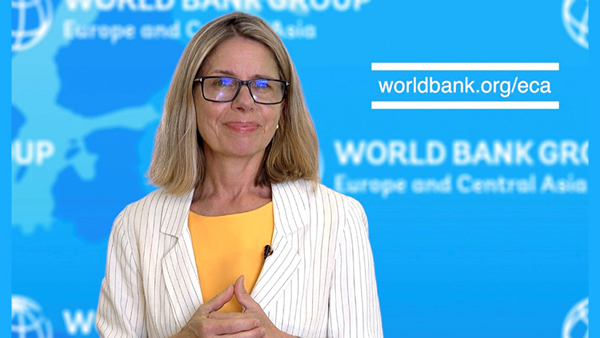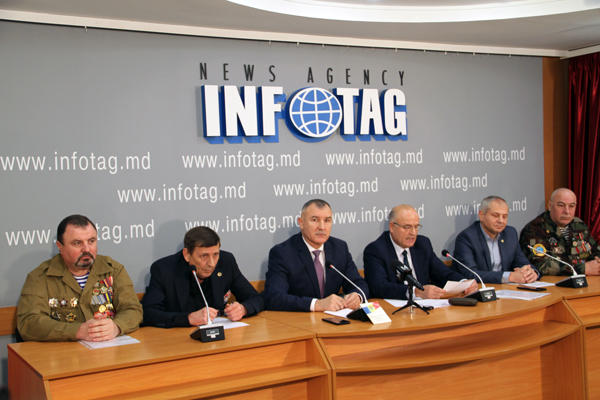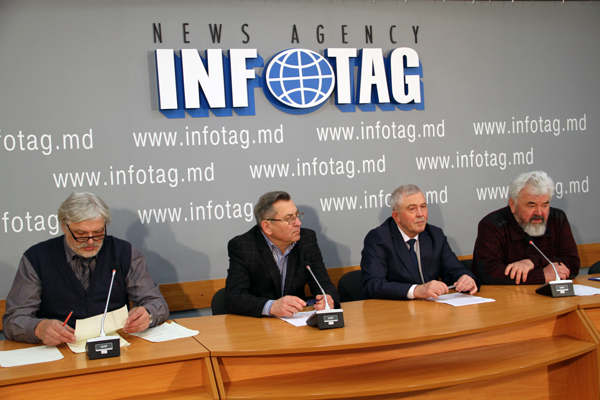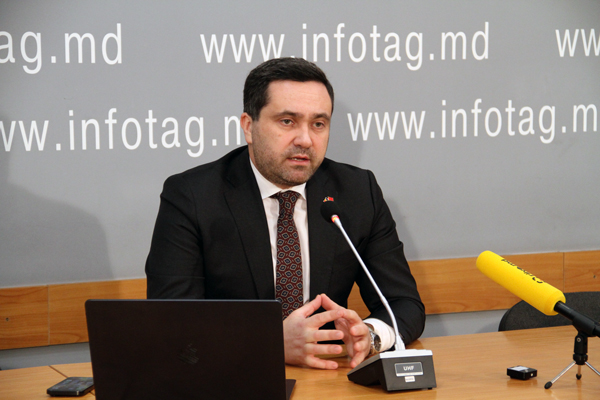Interview
ANNA BJERDE: WB READY TO WORK TOGETHER WITH EVERYONE TO SUPPORT MOLDOVA'S MUCH WANTED ACCESSION TO THE EUROPEAN UNION

Interview to Infotag with Anna BJERDE, World Bank Vice President for Europe and Central Asia
INFOTAG: Dear Ms. Vice President, welcome to Moldova and thank you very much for finding time to answer to the questions for Infotag News Agency. Why are you in Moldova and why this time of the year? Have you visited our country before?
Anna BJERDE: Thank you for this opportunity. I am in Moldova to meet with the country’s leadership, our main counterparts, and development partners, to discuss Moldova’s most critical needs and how the World Bank can provide quick and efficient support over the short and longer-term, which is equally important. This year we are celebrating the 30th anniversary of partnership between Moldova and the World Bank Group. We started our collaboration during difficult, transitional times for Moldova, just a year after gaining independence and a few months after the war on the banks of the Nistru river came to a standstill.Three decades later we continue working together to transform the country for the better.
INFOTAG:How did it all begin? What was the first financial support provided by the World Bank to Moldova? How much support in general did Moldova receive over this period?
Anna BJERDE: Moldova joined the World Bank in 1992, which was a challenging year for the country not only for the reasons I just mentioned, but also because of the severe drought that hit. So, in 1993, (when your Infotag news agency just started its work in Moldova), we provided the first financing for the Emergency Drought Recovery Project in the amount of US$ 26 million. Since that time, we have advocated for improved governance and transparency, supported important policy reforms, and supported the achievement of remarkable results that improved the lives of ordinary Moldovans.More than $1.9 billion has been allocated to over 60 operations in the country.
INFOTAG:Do you think the collaboration has been successful? What are the main areas of support and main achievements?
Anna BJERDE: After going through the shocks of the 1990’s and since the early 2000s, Moldova has made significant progress in reducing poverty and promoting inclusive growth. In fact, Moldova was among the top 15 countries in the world and among just 3 countries in the ECA region which managed to eradicate extreme poverty between 2000 and 2015. Policy reforms have deepened the path toward European integration, and despite difficulties, Moldova made some important steps forward by signing the Association Agreement with the European Union in 2014 and by obtaining the liberalized visa regime for Moldovans. In 2020, Moldova graduated from a lower middle-income country to an upper-middle income country.
I’m proud of the World Bank’s contribution to this progress. Some of the highlights include: creation of an online one-stop shop for business permits and a reduction in the number of days required for business registration from 14 to 4, leading to savings of over US$17 million annually for businesses. Since 2016, more than 1,200 jobs have been created in the export sector, and in agriculture, over 1,000 business start-ups have been launched since 2003, helping create more than 5,600 new jobs, along with support for preparing Moldova to be accepted by the EU as an exporter country for specific products. With the support of an agriculture project, 47 producer groups are now able to access premium markets for fruits and vegetables.MConnect, the government’s interoperability platform and the backbone of further public service modernization, was created and facilitated the transition from paper-based to online processes along with MSign. We helped to improve the reliability and quality of district heating services for end consumers and enhanced operational efficiency and financial viability of Chisinau’s district heating company. Our emergency COVID-19 response was swift, with medical relief and social support to the most vulnerable, and much-needed cash transfers to about 72,000 poor households came in due time.
At the same time, we helped to provide 10,000 laptops to school children to continue learning during the pandemic. Between 2015-2018, 20 hub-schools across Moldova were renovated and supplied with furniture, learning aids, and software to accommodate the diverse needs of children with disabilities. We invested in improving the road infrastructure, and providing safe and sustainable road accessibility to education, health, and market facilities along 150 kilometers of local road corridors.
INFOTAG:This sounds impressive, but what did not go well, what could have been done better over three decades?
Anna BJERDE: As I said, Moldova made significant progress in many areas, but the speed of the reforms could have been faster. Some of the reforms were slowly or not effectively implemented. For many years the society was polarized and the external environment was quite adverse, which hampered agreement on a common development goal.
Low labor productivity and skills mismatch in the labor market, and climate-related shocks are some of Moldova’s biggest economic challenges. For many years, business confidence was slow due to issues around transparency, accountability, and corruption, and the macroeconomic framework remained vulnerable. Large-scale out-migration, combined with decreasing fertility rates, has led to an alarming decline in the population and an increased share of elderly people, putting pressure on the pension system and limiting long-term competitiveness. In other words, Moldova’s human capital could gain a great deal from more and better investment in the education and the health of boys and girls and their families, since this lost potential is having a significant impact on the economy.
INFOTAG:What about the present? How is the World Bank helping Moldova during this difficult period due to geopolitical uncertainties?
Anna BJERDE: We mark our 30 years of collaboration with Moldova during very unfortunate circumstances that were hardly imaginable last December when the country was just recovering from the COVID-19 pandemic and was hit by high energy prices.Yes, it was challenging then, but the devastating invasion of Ukraine by Russia has greatly impacted your country where you now face significant challenges. Hundreds of thousands of refugees chose to escape from war and find shelter here. Moldova became the country receiving the highest number of refugees per capita, and the first non-EU country facing the inflow. I recently visited Ukraine and witnessed what people had to escape from, so thank you so much for your kind help and hospitality. This amazing effort could not remain unseen and drew so much needed humanitarian, financial and political support from the international community.
The World Bank, like many other development partners, responded swiftly to this unprecedented crisis by providing budget support to the government, in the amount of $159 million, to mitigate the impact of the war on refugees and households, as well as build resilience to reduce vulnerabilities to future shocks. And we, together with other development partners of Moldova, continue to join effort to help the country go through these difficult times. Last week we approved a grant financing package in the amount of $43.76 million. The grant financing for this budget support is funded by the Multi-Donor Trust Fund for Co-financing of the Moldova Development Policy Program which was established by the World Bank in recognition of Moldova’s hosting of refugees and includes contributions from Norway’s Ministry of Foreign Affairs and the United States Agency for International Development. We will continue working for more donor funding in the coming months.
As for our current program in Moldova, we currently have 12 projects with a total commitment of $650million that are being implemented by government counterparts. Areas of support include regulatory reform and business environment development, modernization of government services, tax administration, land registration, education, roads, health, agriculture, water and sanitation and energy. We always aim to support areas that will have the most impact for the population. Through this support, more citizens can use improved and more secure local roads to access hospitals, schools, markets, and government services. Just one concrete example: a citizen from the Hirtopul-Mare village, can now travel on a new, secure road to access a Center of Assisted Service Delivery in the town of Peresecina supported by World Bank assistance. This was not possible just a year ago, when the same citizen had to spend more money and twice as much time to access a more remote location using an underdeveloped road and wait in a longer line to receive the service. I am very happy that we have many such such examples describing how our collaboration is improving the lives of Moldovans.
INFOTAG:And how about the future. Where do you see Moldova at next anniversary of partnership?
Anna BJERDE: Clearly, the challenges in Moldova, in the region and globally may vert well persist, and we do not have any certainty of when the aggression against Ukraine will end and what will be the ultimate impact, including on Moldova and other countries in the region. We will stand with Moldova through these difficult times and provide support both to address the crisis and the medium-term development priorities.
We are now at the final stage of preparing a new Country Partnership Framework for the coming five years that will be aligned with Moldova’s development priorities. Under this new Framework, we will work together to make public services more accessible, efficient, and transparent; the economy more vibrant, green and sustainable and, of course, to ensure that Moldovans have access to better quality education, health and the poorest are supported, especially when crises hit. And here, I would like to emphasize that preparedness for future crises very much depends on the capacity of the authorities to tackle them. Therefore, while emergency support and infrastructure projects are very important components of our collaboration, it is equally, or even more important to not forget the longer-term development agenda, and investment in human capital development and capacity building is of paramount importance in this regard.
We are also excited to support Moldova’s path towards EU accession, especially since Moldova recently was granted EU candidate status. We, in the World Bank, remain committed to working together with all stakeholders in supporting the much-desired EU accession and building a prosperous and inclusive society for all Moldovans.
INFOTAG: Thank you very much, Ms Vice President!
Anna BJERDE: Thank you and happy winter holidays. La Multi Ani, Moldova!
























Add Comment